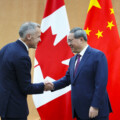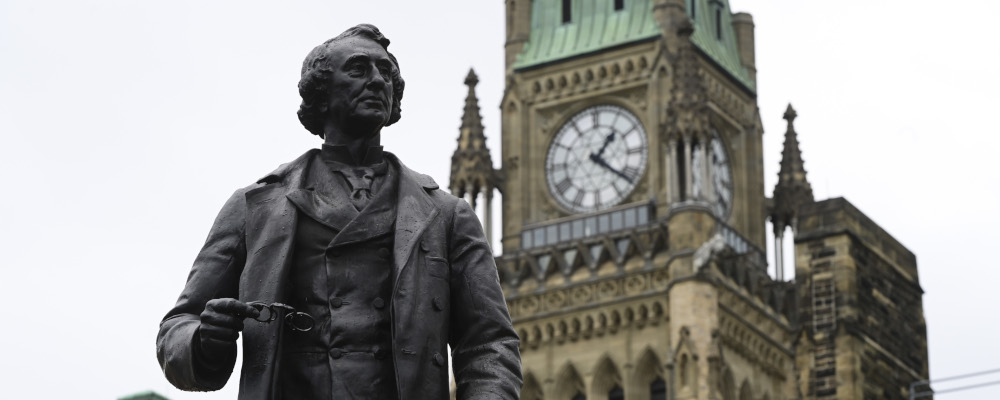The recent decision by Library and Archives Canada to delete a website focused on the prime ministers of this country is just one of the latest examples of a nation uncertain of how to deal with its past.
The website in question, called First Among Equals, was established in 1994 and contained quick biographical information about all of the country’s prime ministers, including speech excerpts, short sketches of their legacies, and information about their private lives. At the time of its unveiling, five former prime ministers attended an upbeat ceremony.
The site was meant to bring some life to the country’s former leaders through anecdote, analysis, and historical artefacts. But no more. The website has been unceremoniously scrubbed. Students, teachers, and the wider public are no longer able to access the website.
It is well understood that historical interpretations change over time. As LAC spokesperson Pascal Laplante told Ottawa-based Blacklock’s Reporter, “[The site] is outdated historical content that no longer reflects current understanding of history.” LAC was “ensuring web content is accurate and up to date,” he said.
It has been nearly 30 years since this website was updated, and no doubt it was time for renewal. A revamped website would have been a great benefit to those seeking to understand the country better. But that is not the case.
Incredibly, there is no plan to replace the deleted site. Marie-Ève Doucet, the senior communications advisor at LAC, said that, “in the short term, we plan to update the PM web page with quick links to all of the PM archives found in Collection Search.”
That translates as: There will be no new website dedicated to the country’s prime ministers, but we will have links directing you to find the primary documents on your own.
What is also quite clear in this sorry episode is that the real target of the memory hole was Sir John A. Macdonald, whose page neglected to mention the shameful legacy of residential schools. A second standalone exhibit on him was also deleted.
Did the pages on Lester B. Pearson and Arthur Meighen also no longer reflect the “current understanding of history?” And how much understanding of the history of Canadian prime ministers will there be now that the entire website has been deleted?
Was there a better way to handle this than to remove a website entirely with so little explanation? Of course. There should have been a replacement project already undertaken and ready to unveil. A rewritten and superbly constructed site useful for all Canadians but particularly students is what was needed. But maybe studying some of the country’s most important leaders is something the Trudeau government is signalling as no longer important.
The Trudeau government is clearly pushing back against former prime minister Stephen Harper’s vision of Canadian history.
A 2019 cabinet directive about historical monuments and plaques noted that the legacies of “colonialism, racism, and patriarchy” must be considered. All well and good. But does that mean throwing everything else out?
The Trudeau government is clearly pushing back against former prime minister Stephen Harper’s vision of Canadian history, a philosophy that included spending nearly $30 million promoting education about the War of 1812 as well as highlighting Canadian contributions to the wars of the 20th century. It was further reflected in the publication of its 2009 Canadian citizenship guide titled Discover Canada, which the Liberal government itself is now revising. There will be more historical battles to come.
This latest Orwellian deletion of important history is not limited to prime ministers, however. LAC also vanished a website dedicated to the War of 1812 and Canadian Confederation. Elsewhere, other historical figures are being airbrushed from the national story.
For example, this year marks the 100th anniversary of the discovery of insulin, a Canadian scientific achievement led by doctors Frederick Banting, Charles Best and James Collip at the University of Toronto. Banting was awarded the Nobel Prize in 1923 for his work but a coin to be released by the Royal Canadian Mint will make no reference to him at all.
When websites are removed and statues taken away, it seems obvious that thoughts turn to George Orwell’s 1984 (are they even teaching that anymore?). “Every record has been destroyed or falsified, every book rewritten, every picture has been repainted, every statue and street renamed, every date has been altered,” he wrote in the famous dystopian novel that is now more relevant than ever. “And the process is continuing day by day and minute by minute. History has stopped. Nothing exists except an endless present in which the Party is always right.”
History should be debated, not expunged. Statues should remain with more context added to them, not removed. Individuals should be both celebrated and criticized, not disappeared.
“There are also many lessons and much advice offered by history, and it is easy to pick and choose what you want,” wrote Margaret MacMillan, one of our most gifted historians, in her 2008 book The Uses and Abuses of History. “The past can also be used for almost anything you want in the present. We abuse it when we create lies about the past or write histories that show only one perspective.”
In some arenas, addition by subtraction works. Not in history.
Recommended for You

The Weekly Wrap: Stop painting Alberta as the villain of Canada

Where the CBC went wrong

The Week in Polling: Majority of Canadians want the Alberta-B.C. pipeline; Optimism about the Carney government drops; 87 percent of Canadians concerned about the state of housing

‘An approach that lacks principles’: The Roundtable on Canada’s confusing China reset and the lack of scrutiny on Carney





Comments (0)